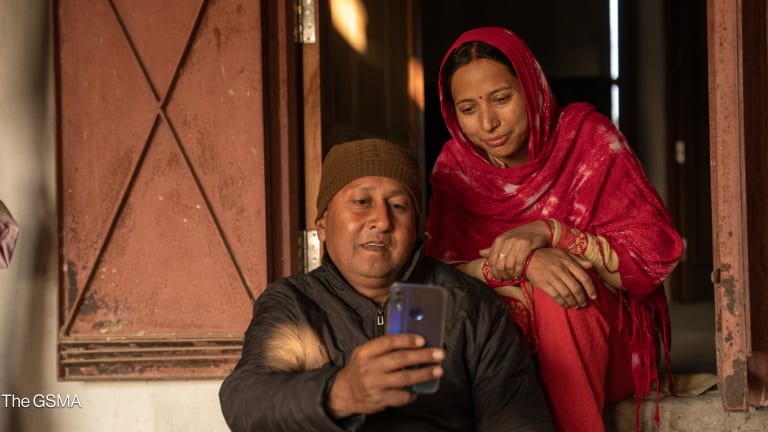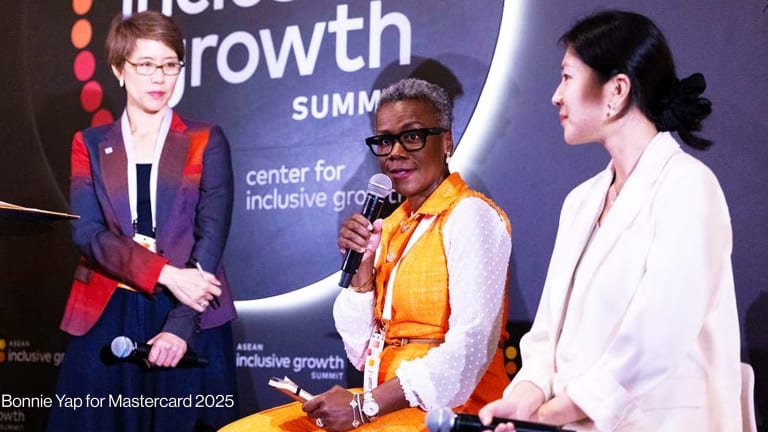
Data science has the potential to drive sustainable development in least developed countries, or LDCs, by supporting the creation of good-quality jobs, improving financial inclusion, and tackling crises ranging from climate change to food insecurity.
However, LDCs are currently home to the most digitally excluded communities in the world, with only 36% of the population using the internet and less than 10% accessing e-commerce or e-government services. Investing in digital skills and improving access to affordable data and devices — whether laptops or smartphones — will be key to bridging this digital divide and nurturing a new generation of data scientists and tech talent that can create solutions that will power inclusive economic growth. But the development community must also up its own tech game and partner more closely with the local private sector to create an enabling business environment.
On the occasion of the World Economic Forum’s annual meeting in Davos this January, Devex and Microsoft hosted a roundtable discussion to dig deeper into how data science and digital inclusion can unlock sustainable economic growth in LDCs.
“Technology is one of the most transformative resources at our disposal. It can help organizations do more with less and it can be an equalizer,” said Kate Behncken, corporate vice president at Microsoft Philanthropies, and one of the event’s co-hosts.
“Technology can help level the playing field for everyone to access critical services like health care and education, to gain new skills, secure jobs, and improve livelihoods — but without the digital skills to unlock the value of connectivity and the power of technology, people get left behind and the divide only increases.”
Here are five other top takeaways from the discussion:
1. Data-driven solutions are key to tackling intersecting crises
Data-driven “tech for good” solutions are key to tackling the multiple intersecting crises facing the world, including slow pandemic recovery and skyrocketing food prices caused by Russia’s war in Ukraine. These solutions could, for example, arm farmers in LDCs with data about their microclimate. Such information empowers them to make decisions that result in better yields and reduced energy use — helping them tackle food insecurity and mitigate climate change risk simultaneously — explained Mariana Vasconcelos, CEO at Agrosmart, the largest Agdata network in Latin America.
Tracking data about farmer practices can also help companies and governments monitor the environmental, social, and governance, or ESG, data related to their supply chains, she said.
In Zimbabwe, agricultural extension workers use smartphones connected to central databases to monitor the distribution of seeds to farmers and their yield, the country’s Minister of Finance Mthuli Ncube noted during the discussion. He added that this helped Zimbabwe achieve wheat self-sufficiency in 2022 for the first time in nearly two decades.
Applying artificial intelligence to a mix of simple smartphone pictures, satellite imagery, geotags, big data, predictive analysis, and other data could substantially transform the fight against hunger, eventually replacing the use of mid-upper arm circumference tape — which has long been used to identify children at risk of acute malnutrition — to develop more sophisticated tools for predicting where and when stunting and wasting will likely occur, its assessment and speedy treatment, according to Ashwini Kakkar, chairman of the nonprofit organization Action Against Hunger.

2. Scaling up fintech solutions will improve financial inclusion
The development sector should scale up the use of fintech solutions such as digital currencies, which are critical for turning the unbanked into microentrepreneurs, argued Dante Disparte, chief strategy officer and head of global policy at digital financial services firm Circle.
The U.N. Refugee Agency, for example, is now piloting a blockchain-powered, cash-based intervention that pays Circle’s USDC stablecoin — a type of cryptocurrency pegged to the United States dollar — directly into the digital wallets of people displaced and impacted by the war in Ukraine.
Supporting home-grown tech platforms and marketplaces with catalytic funding and impact investment can also help entrepreneurs in low- and middle-income countries, or LMICs, access finance, added Fatoumata Bâ, founder and executive chair of Janngo Capital, Africa’s largest gender-equal tech VC fund investing in start-ups leveraging technology to achieve the Sustainable Development Goals in Africa. For example, small store owners using Sabi — a Nigerian B2B platform that connects them with fast-moving consumer goods manufacturers — have been able to build a sales track record, helping them access trade finance for the first time, she said.
3. Nurturing tech expertise is critical for more sustainable development
Technology can help LDCs create more sustainable development models and leapfrog the historic pathway of low-skilled manufacturing. But to achieve this, a new generation of tech expertise must be nurtured.
While there is a huge demand for artificial intelligence skills on the African continent, a recent Microsoft study showed the continent that for every AI expert in Africa, there are 14 AI experts in the global north, noted Juan M. Lavista Ferres, the vice president and chief data scientist at Microsoft, during the event.
To change this, he said young Africans must be given the opportunity to learn, as well as access to processing power and data.
Janngo Capital’s Bâ explained how the Africa Medical Supplies Platform, or AMSP, is revolutionizing health care supply chains in Africa. By leveraging data-driven solutions, it has enabled the pooled procurement, cross-border logistics, and last-mile delivery of medical supplies in Africa in order to support the African Union’s COVID-19 response. She also flagged the success of Andela, a platform that launched in Nigeria in 2014 to train aspiring developers, data scientists, and engineers, and help them find jobs.
Lance Pierce, CEO at NetHope, a membership consortium of nonprofits working in support of digital transformation among humanitarian relief, international development, and global conservation organizations, added that his organization had attracted high-quality applicants in Malawi, Kenya, and Turkey over the past year as it expands its hiring. Salaries for skilled tech professionals in LMICs are beginning to catch up with those offered elsewhere, he noted.
4. The development sector must take the lead on new technologies
The development sector needs to be more forward-looking, taking a lead on utilizing and enhancing new technologies, suggested Louise James, managing director at Accenture Development Partnerships. She encouraged development organizations to proactively drive debate about how the metaverse, for example, could be a tool for fundraising, advocacy, and programming.
Why is it so hard to close the digital divide?
Devex spoke with a range of experts about the state of the digital divide, why closing it requires more than just getting people online, and what’s needed moving forward.
Andrew Zolli, chief impact officer at public Earth imaging company Planet Labs, called on the sector to make fuller use of the technology capabilities that firms like his are building on its behalf. The sector is often trying to solve 21st-century challenges with 19th-century tools, he said, because they’re the ones that donors understand. However, while development organizations should invest in tech skills — including through hiring data scientists — tech firms should also work to make tools easier to use, he added.
Shamina Singh, president of Mastercard’s Center for Inclusive Growth, flagged the work of data.org, which champions the use of data science for social impact. She noted that its data maturity tool helps social impact organizations assess their own progress in data science and recommends actions to accelerate that journey.
5. Philanthropic capital and private-sector partnerships are vital for inclusive growth
Philanthropic capital and private-sector partnerships are vital for creating an enabling business environment and ensuring that technology achieves its potential as an equalizer in societies. Singh said we have to de-risk using philanthropic capital so that commercially sustainable social impact can come to fruition over the long term.
Microsoft’s Behncken also pointed out the opportunity for philanthropic investments to test out models that work and then use influence, partnerships, and a collective footprint to bring others to the table.
As an example, Microsoft’s Airband Initiative is helping to close the digital divide and nurturing a new customer base for itself and its partners by investing in digital skills and affordable internet access for underserved communities.
But initiatives like this only work with the right people at the table — and the right partnership models. Bridging the digital divide will require a broader pool of stakeholders to collaborate in a more coordinated way so that efforts are not duplicated and each partner plays to their strengths, Behncken concluded.








